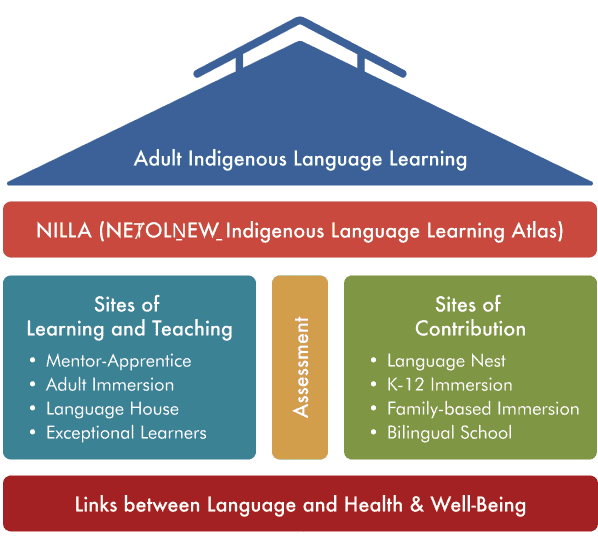National Network
Built on strong Partner connections and networks across Canada, united in their goal of Indigenous language revitalization and maintenance, embracing the diversity of languages across distinctive Indigenous communities and cultures.
Capacity Building
Building capacity among Indigenous people maximizing the resources available to maintain, revitalize, and strengthen efforts towards the nation‐wide revitalization of the Indigenous languages.
Foundation of Hope
Sharing a vision of hope and empowerment of research and community practice, taking a stand to ensure the continuation of Indigenous languages in the lands claimed as Canada.
Project History
Indigenous communities across Canada are working hard, undertaking essential language revitalization and maintenance work. Increasingly, adults have been identified as a group of learners who hold great potential to contribute to the revival of Indigenous languages as parents, workers, community or family members, at times bridging gaps between Elder-speakers, children, and youth.
Year Founded
2013
Founding Members
Drs. Onowa McIvor & Peter Jacobs
W̱SÁNEĆ School Board & First Peoples’ Cultural Council
Community Partners
9
Languages Represented
40+
Project Themes
Adult learners hold great potential to contribute to the revival of Indigenous languages. Yet, we know that learning languages at any age does not happen in isolation, and so our Partnership uses an approach that engages with — and studies — the multiple contexts in which adult learners both learn and contribute. These study areas are organized into five research themes in our Project House below.
Select a theme to learn more.
An online portal developed with participating Indigenous communities to learn from each other and combine efforts across Indigenous language revitalization and maintenance projects.
As more Indigenous people learn their languages, we believe context‐relevant assessment tools can support language learning progress. While continuing to develop the NEȾOLṈEW̱ assessment tool several Partners are also exploring assessment within their community context.
A central goal for communities is advancing proficiency amongst language learners to create new speakers across generations. We aim to better understand the effectiveness and challenges of Indigenous language learning through various different programs and pedagogical models.
Adult Indigenous language learners are often called upon to pass on the language to others while continuing to learn their language themselves. Our research considers the places adult language learners contribute as teachers, parents and grandparents, as well as other kinship and community roles.
Together we aim to explore the ways involvement in language learning, speaking and teaching affects health.

